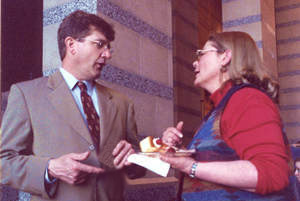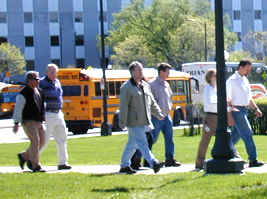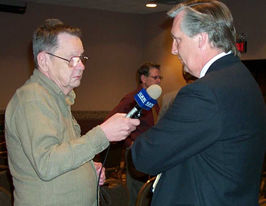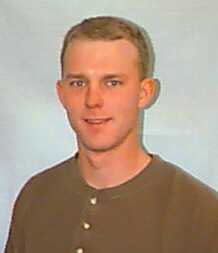 |
 |





 |
 |
 |
 |
 |
 |
WTS conference widens view, provides access to industry leaders for participants
|
 |
 |
 |
Kevin Gray, chief financial
officer, and Wendy Frederickson, from Virginia's maintenance office, converse
during the Women's Transportation Seminar, held in the Twin Cities May
15-17. Photo by Craig Wilkins
|
More than 300 members of the Women’s Transportation Seminar met in the Twin
Cities May 15-17 to examine ways to improve the nation’s constantly evolving
transportation system. They also came to celebrate the organization’s 25th anniversary
of advancing opportunity, diversity and access for women in the transportation
industry.
Guided by the conference’s theme of "Advancing Access," participants
explored areas such as linking land use and transportation, using the design-build
process and increasing transportation access for low-income, disabled and elderly
people. They also visited Twin Cities area facilities related to context-sensitive
design, airport development and security, and intelligent transportation systems,
and saw how art can be used in the design of public transportation infrastructures.
Participants also had access to leaders in the transportation industry who
stressed finding transportation solutions by bringing together people at all
levels.
Session leaders included Carol Flynn, a retired state senator and former transportation
committee chair from Minneapolis; Lorrie Louder, senior vice president of the
St. Paul Port Authority, and Margo LaBau, Mn/DOT’s chief of staff.
During the conference’s opening reception, participants heard St. Paul Mayor
Randy Kelly emphasize the need for planning to meet future transportation needs
and using transportation to connect people with affordable housing and access
to jobs and shopping areas.
Commissioner Elwyn Tinklenberg helped open the conference by facilitating a
panel discussion of key transportation leaders. The panelists included Mary
Peters, administrator of the Federal Highway Administration; Lynn Sahaj, associate
administrator for program management with the Federal Transit Administration,
and Cecelia Hunziker, regional administrator for the Federal Aviation Administration’s
Great Lakes Region.
The panelists responded to a report, "A New Transportation Agenda,"
published by the National Center for Intermodal Transportation after the terrorist
attacks last September. The report calls for new ways to address transportation
issues related to security and underscores the importance of coordination and
cooperation.
Each panelist described her agency’s experience during and after the attacks
and cited the role technology and communication play in future transportation
planning.
The conference helped widen the view of many participants, including Vickie
Johnson, a Mn/DOT employee development specialist at Duluth.
"This conference gave me a much more global look at the industry,"
she said. "It provided an opportunity to meet with women from other states
to find out what’s going on in their areas and to learn about other aspects
of transportation. And the conference will help me set up training for people
because I now have a greater understanding of what they do and what they will
need to know in the future."
By Craig Wilkins
|
back

|
 |
Environmental Services to transfer bike, pedestrian functions to Transit Office
|
 |
 |
The Senior Management Team decided May 13 to move the bicycle and pedestrian
programs to the Office of Transit from the Office of Environmental Services.
This means that some employees whose focus is bike and pedestrian transportation
modes will soon join the Transit office.
"I think this move is appropriate," said Dick Elasky, director, Environmental
Services. "It heightens the visibility of sustainable transportation as
a viable transportation choice. We as an agency need to present a variety of
transportation options."
Employees whose focus is on environmental programs such as the Scenic Byways
Program and the Great River Road Program will remain in Environmental Services,
Elasky said, adding that the details of which activities get transferred will
be worked out in the transition plan. The Cultural Resource Unit will remain
as well, he said, and may need enhancement to handle an ever-increasing workload.
Signing authority for project memoranda that do not require approval from the
Federal Highway Administration will be distributed to the districts and Metro
Division.
These changes are part of the Mn/DOT’s ongoing Shaping Our Future effort, which
strives to adapt the department to changing state and national priorities, economic
climate, new technology and customer needs. For more information, see the Shaping
Our Future Web site, which includes decisions, timelines and previous Mn/DOT
Newsline articles.
|
back

|
 |
Legislature fails to pass transportation funding bill, derails commuter rail
|
 |
 |
Drivers won’t be seeing an increase in their gas tax next year, but down the
road they may see greater congestion and limited transportation choices resulting
from the Legislature’s failure to pass a transportation-funding bill this session.
The Legislature adjourned Monday, completing a session that went "from
bad to worse" when it came to transportation, Commissioner Elwyn Tinklenberg
said.
"Incredibly, a handful of legislators prevented Minnesota from moving
forward by refusing to address what is one of the most pressing issues facing
our state—a long-term, reliable source of transportation funding," he said.
"There was broad support from the public and the business community for
increasing funding for transportation, and legislators chose not to address
it."
The Senate’s transportation finance bill included a six-cent per gallon gas
tax increase, but the House version had none. In April, the Minnesota Transportation
Coalition—a group of business, labor, local government and transportation organizations—recommended
a five-cent per gallon gas tax increase as a transportation finance compromise.
Capital improvements
Besides trying to secure new transportation funding, Mn/DOT also sought money
for capital improvements. However, there will be no new Mankato headquarters
building nor a consolidated operations support facility in Oakdale soon. These
projects, and the Northstar commuter rail, were omitted from the capital improvements
bonding bill the Legislature passed in the waning hours of the session.
In January, the governor had asked for $120 million for the Northstar commuter
rail, which would connect Minneapolis and St. Cloud. This was the amount the
state needed to contribute in order to receive $147 million from the federal
government. Local governments also would contribute to the project.
The Legislature’s failure to fund the Northstar commuter rail will likely result
in federal transit dollars going to other states and not to Minnesota, Tinklenberg
said. He said more than two dozen cities—including Chicago, Cincinnati, Dallas
and Denver—are competing with Minnesota for federal transit funds for commuter
rail.
"Minnesota missed a great opportunity here to have the federal government
help pay for nearly half of the Northstar project," he said.
‘Tough session’ for state employees
Also in the file of "what did not happen this session" is the ratification
of state employee contracts because the House objected to contract language
that provides for health insurance coverage for same-sex partners of state employees.
"It’s been a tough session all around—especially for state employees,"
Tinklenberg said. "I realize that it has been difficult to focus on the
day-to-day activities supporting the delivery of safe and efficient transportation
systems for our citizens when so many issues are unresolved. I appreciate the
effort Mn/DOT workers have demonstrated trying to maintain their motivation
and morale to provide what citizens need."
For more information:
By Chris Joyce
|
back

|
 |
B-BOP Day focuses on bikers, walkers, transit riders
|
 |
 |
 |
|
Capitol area workers
participated in the B-BOP Walk Around the capitol sponsored by Mn/DOT’s
Central Office wellness committee. Steve Zvonar, health and wellness coordinator,
said 193 state employees walked a total of 441 miles, combining a healthful
activity with support for B-BOP Day. Photo by Terri Betsch
|
On Thursday, May 16, LeSueur’s Don Straub passed on a $5 Subway coupon for
riding the bus to keep on doing what he always does—biking or walking to work.
Although Straub, a transportation generalist at the LeSueur Truck Station,
didn’t change modes, thousands of other commuters did by taking the bus, carpooling
or biking to observe the annual Bike Bus or Pool Day to promote alternatives
to driving alone.
B-BOP Day represents efforts by Mn/DOT, transit agencies, private employers
and other entities to encourage commuters to leave their cars at home and get
to work another way.
Mn/DOT and other state employees who B-BOPed to work lunched on hot dogs, pop
and chips at the Capitol and heard remarks from Doug Weiszhaar, deputy commissioner.
Weiszhaar said carpooling is the "single, easiest way" for people
to reduce their dependence on single-occupant vehicles.
He also cited recent expansion of service by the St. Cloud Metro Transit Commission
to Sartell and a new facility in Willmar that supports Kandiyohi Area Transit
as examples of improved service that will attract more commuters to use the
bus.
"Moving Minnesota also includes other travel choices," he said, "including
transit, walking and bikes."
Weiszhaar noted that 20 percent of Minnesota cyclists report they bike for
transportation as well as for recreation.
Capitol area workers also participated in the B-BOP Walk Around the capitol
sponsored by Mn/DOT’s Central Office wellness committee. Steve Zvonar, health
and wellness coordinator, said 193 state employees walked a total of 441 miles,
combining a healthful activity with support for B-BOP Day.
Highlights of B-BOP day for 2002 also included organized bike rides in the
Twin Cities and Rochester and events such as the Subway transit promotion in
LeSueur and in other smaller Minnesota cities.
Rochester’s observance included remote radio broadcasts from the downtown area
to promote the event as well as a prize drawing for a mountain bike and a trip
by Amtrak to Glacier National Park.
Connie Donaldson, director of LeSueur’s Heartland Express, said the city’s
buses doubled their usual passenger total with publicity and the gift certificates
on B-BOP Day, even with the holdout by Straub.
Straub said he’s been doing his 1.5-mile walk or ride to work since he transferred
from the Mankato bridge crew to the LeSueur shop 22 years ago.
"I got used to having that half-hour drive time, so I decided to walk
or bike and save the upkeep on a pick-up," he said. Straub estimates he’s
saved thousands of dollars by walking or biking instead of driving.
"The walk or the ride gives me time to get my head together before work.
They help keep my heart going, too," he said.
By Craig Wilkins
|
back

|
 |
Commissioner says Sauk Rapids bridge project can proceed without city okay
|
 |
 |
 |
Paul Stack (left), from
WJON-AM radio in St. Cloud, interviews Commissioner Elwyn Tinklenberg
last week about his decision on the Sauk Rapids bridge project. Photo
by Mike Travis
|
Although expressing some reservations, Commissioner Elwyn Tinklenberg last
week upheld a state Dispute Resolution Board’s decision that allows Benton County
officials to proceed with the Sauk Rapids bridge construction project.
The project, which would replace a bridge across
the Mississippi River in Sauk Rapids, has been a source of contention between
Benton County and the city of Sauk Rapids, involving citizens and public officials
alike. The Dispute Resolution Board—including elected officials and engineers
from other cities and counties, as well as a Mn/DOT representative—stepped in
and recommended that the project proceed.
"While I am upholding the decision of the Dispute Resolution Board, I
do have concerns both about the cost of the bridge and the fact that the two
sides are so far apart in terms of design," Tinklenberg said at a press
briefing May 15 in Sauk Rapids.
"I strongly recommend that the county not proceed with the project until
it identifies the source of and secures all funds necessary to complete the
bridge," he added.
The commissioner also recommended that representatives from both the city of
Sauk Rapids and Benton County try to come closer in agreement on a design.
"This is the principle behind interregional corridors. Each community
along a corridor must fully understand the impact it has on all the others.
This bridge may seem like a local project, but in the future it will have regional
significance," he said.
The commissioner’s role in the dispute was to ensure that the process followed
to resolve it was fair.
|
back

|
 |
Mankato’s Fowlds named Young Engineer of the Year
|
 |
 |
 |
|
Chad Fowlds, resident
engineer for the Mankato District, recently was named Young Engineer of
the Year by the Minnesota Society of Professional Engineers.
|
The Minnesota Society of Professional Engineers named Chad Fowlds its Young
Engineer of the Year at the society’s annual meeting, held May 16-17 in Rochester.
Fowlds serves as the resident engineer for the Mankato District, where he is
charged with coordinating and overseeing all of the construction projects out
of the district office. Fowlds is the youngest individual to hold the position
of resident engineer within Mn/DOT.
Nominees were judged on the basis of engineering achievement; professional
experience; educational and collegiate achievements; technical and professional
society activities; civic and humanitarian activities; and continuing competence.
Fowlds has been an active member of MSPE’s for many years, serving on the executive
committee of the Traverse Des Sioux chapter and contributing to the chapter’s
educational and scholarship efforts.
Fowlds is a 1995 civil engineering graduate of South Dakota State University,
where he graduated fifth in his class. While in school, he was a student member
of the National Society of Professional Engineers and the American Society of
Civil Engineers.
|
back

|
|
 |
|



